Electric Car Charging Costs
If you’re thinking of buying or leasing an electric car, chances are you’ll have some questions about electric car running costs, particularly how much it costs to charge an electric car.
To help you compare costs easily, Nationwide Vehicle Contracts has put together a handy guide on how much it costs to charge an electric car, the difference in charges between home, public and work charge points and which electric cars are cheapest to charge.
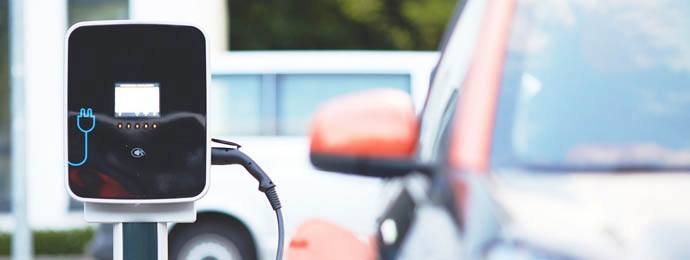
How much does it cost to charge an electric car?
Just like fuel costs vary between filling stations, the cost to charge an electric car in the UK varies between home, work and public charging.
The typical charging cost for an electric car with a 60kWh battery and a 200-mile range is:
- Charging at home: Costs between £6.60 to £8.40 for a full charge
- Charging at work: Many employers offer free access throughout the day, but paid services typically cost between £8.30 and £9.40 for a full charge
- Charging at public locations: Some venues offer free access, but paid services typically cost between £5 to £12 for a full charge, depending on the speed of the charger.
How much does it cost to charge an electric car at home?
Most EV drivers choose to charge their electric car at home overnight as this is often the easiest and cheapest way to top up your car’s EV batteries.
Here in the UK, there are two ways to charge your car at home, with differing costs of between £6.60 to £8.40 for a full charge depending on which option you choose:
- Charging with a standard three-pin domestic plug (3kW)
- Charging with a wallbox home EV charging unit (7kW - 22kW)
TIP: You can calculate the cost to fully charge your own electric car by using the formula: |
Costs to charge an EV using a standard three-pin domestic plug
The easiest way to charge your EV at home is by using a standard three-pin domestic plug socket. Unlike a wallbox home-charging unit, there are no installation costs involved, but because a normal three-pin plug is limited to 3kW, it can take the car several hours to charge.
On a standard 14p per kWh electricity tariff, you will pay an average of £6 to charge a 40kWh Nissan Leaf for 13 hours at a 3kW standard three-pin domestic plug. However, as electricity costs less off-peak (e.g. overnight), this charge is can be as low as £4.
TIP: Many car manufacturers don’t recommend using a standard three-pin domestic plug long-term to charge your EV as it can cause damage to the socket due to the high amperage drawn over a sustained period of time. |
Costs to charge an EV using a wallbox home EV charging unit
The quickest way to charge your EV at home is by using a home charging unit known as a wallbox. A typical home EV wallbox can supply power between 7kW and 22kW, cutting the charge time down significantly with little change in the cost of power.
On a standard 14p per kWh electricity tariff, you will pay an average of £8.40 using a 7kW wallbox. Unlike a standard three-pin domestic plug, you can charge your car in as little as eight hours for a full charge, with many wallboxes offering a compatible smartphone app so that you can keep an eye on your charge level.
How much does it cost to install an electric car charger at home?
The price of a home EV charger depends on a number of factors including the speed of the charger and the type of installation required but most providers offer a standard 7kW wallbox charger including installation for around £899.
To be eligible for the OLEV grant you must:

Choose an OLEV-eligible car
All full battery electric vehicles are eligible, but not all plug-in vehicles are eligible so be sure to check CO2 emissions are below 50g/km to order to take advantage of the OLEV Electric Vehicle Homecharge Scheme (EVHS) grant.

Have private, off-street parking
Such as a driveway, garage or private land where a charging cable will not cross a pedestrian pavement or cause a safety issue.

Install an OLEV-approved charger
The charging unit must be on the UK Government's list of approved manufacturers and models under the Electric Vehicle Homecharge Scheme (EVHS).

Use an OLEV-approved installer
The installer must be listed on the UK Government's list of approved installers under the Electric Vehicle Homecharge Scheme (EVHS) in order to carry out EV charge point installations and claim government grants on behalf of the customer.
Electricity tariff costs
Before you get an electric vehicle, you may want to think about how it will impact the cost of your home electricity bill. The cost can fluctuate depending on when you charge, which tariff you use, how big your EV’s battery is and how much energy you need.
“Home charging is the most popular way to recharge your electric car, and it's important to be on a tariff that offers the cheapest rate. The average domestic electricity rate in the UK is around 28p per kWh, although tariffs such as Economy 7 offer cheaper rates overnight.”

If you plan to use a home EV charger, it’s important to be on the best home energy tariff to keep this cost as low as possible. Many energy companies now offer EV tariffs which reduce the cost of energy overnight when the demand on the grid is reduced.
TIP: You can save even more money with solar panels linked to your home wallbox to generate and store electricity. |
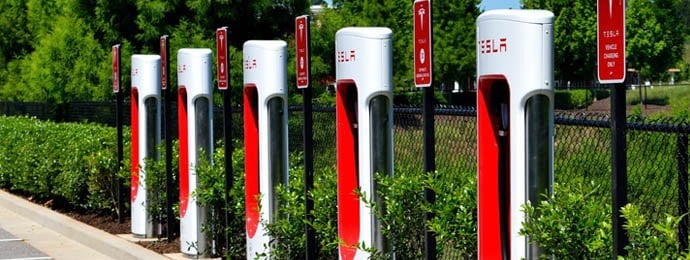
How much does it cost to charge an electric car at a charging station?
If you’re out and about, charging your electric car at a public charging station is a great way to top up your EV’s battery. While many public charge points, such as those at supermarkets or car parks, are often free to use, others incur a cost.
The cost of charging your electric car at a public charge point depends on the charge point network, the location of the charge points and its power rating. Here in the UK, there are three types of public charging points:
- Slow public chargers (e.g. on-street or lamp post chargers)
- Fast public chargers (e.g. car park, supermarket or leisure centre chargers)
- Rapid public chargers (e.g. motorway service stations chargers)
Cost to charge an EV at a slow public charger
Slow electric vehicle public chargers are generally rated at 3.6 kW (16A) and will fully charge an EV battery in around six to 12 hours.
Slow EV chargers are typically found in public places, such as on-street or lamp-post chargers, which can vary from 3kW to 6kW.
Many slow public chargers are free to use but some local authorities offer a pay-as-you-go service, typically costing around £1 an hour with an admin or connection fee of around £1.20.
Cost to charge an EV at a fast public charger
Fast chargers are rated at 7kW, 11kW or 22kW (AC) and will recharge an EV battery in four to six hours with a 7kW charger, or one to two hours with a 22kW charger.
Fast chargers are typically found at car parks, supermarkets, or leisure centres, where you are likely to be parked for an hour or more.
The cost of using public charging stations varies, but the charge rate itself usually ranges from 9p per kWh, or you can opt for a subscription service at around £7 to £8 a month.
Cost to charge an EV at a rapid public charger
Rapid charge points supply between 43kW (AC) and 50kW - 120kW (DC) of power and will re-charge most cars to around 80% in 30 minutes depending on the model’s battery capacity and starting state of charge.
Rapid chargers are typically found at motorway service stations or locations close to main routes. While some are free, rapid chargers are generally seen as one of the more expensive ways to charge because they offer a faster charge and greater convenience.
On the motorway, you’ll likely find Ecotricity 50kW rapid charging stations which deliver a full charge at around £12 in less than 50 minutes. Elsewhere, rapid chargers at supermarkets typically cost an average of 24p/kWh, which is around £6 to £7 for 100 miles of range for a 30-minute charge.
Tesla Supercharger Network
If you're considering a luxury car lease deal, such as a Tesla, you can use the Tesla Supercharger Network which has points across the UK. The rapid 150 kW DC units are free to use for a set number of hours but then incur a cost, usually billed at 24p per kWh (kilowatt-hour).
Non-Tesla owners can also use the Tesla Supercharger Network providing they have a compatible charging cable but charging fees vary depending on the network you use. Registration, subscription and connection fees also may apply.
Will I need an electric car charging card to use a public charge point?
To use a public charging point, you'll likely need to register with the charge point provider before use. Modern charge points usually require you to download a free mobile app to use the unit while older public charge points require you to have a Radio Frequency Identification (RFID) card to start charging which can be ordered online.
You can identify which charging schemes charging points belong to by using an electric car charging point map service such as:
How much does it cost to charge an electric car at work?
Many UK businesses are opting to install electric car charging facilities to meet sustainability targets and reduce fleet costs. For employees, charging at work can be a convenient way to recharge their EV whilst parked during the day.
Here in the UK, there are two ways to charge your car at work:
- Charging via a standard three-pin domestic plug (3kW)
- Charging via a commercial wallbox home-charging unit (7kW - 22kW)
The cost of charging an electric car at work can vary between organisations. Many employers offer free access throughout the day for their employees and visitors, while others set a paid tariff. Costs differ depending on the employer with some charge employers charging directly per kWh, or by taking payment for charger time. Typical costs are between £8.30 and £9.40 for a full charge.
TIP: The UK Government offers businesses financial support to have charge points installed at their premises under the Workplace Charging Scheme (WCS). The grant provides up to £350 per socket at 75% of the total cost of installation – up to a maximum of 20 sockets – to be installed on dedicated off-street parking for staff, visitor, or fleet use. |
What electric cars are cheapest to charge?
In addition to the price of electricity and the speed of the charger, the capacity of your EV’s battery pack also impacts cost. If you’re looking to keep running costs as low as possible, choosing an electric with a small battery capacity will not only help to keep the cost of charging down but also reduce the time taken to charge.
Cheapest electric cars to charge
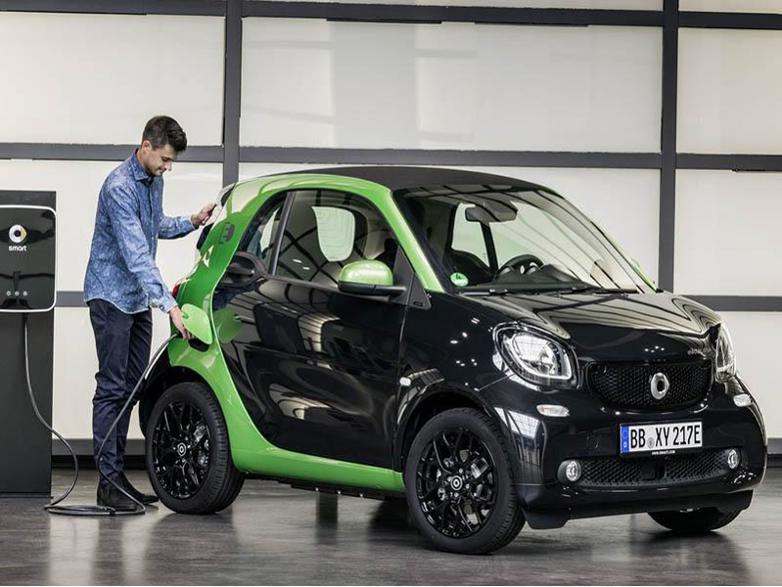
Smart Fortwo Coupe
Top of our list is the electric Smart ForTwo. This super-smart city car not only makes driving around busy city streets a doddle, but it also delivers fantastic economy when it comes to charging thanks to its 17.6kWh battery.
On a standard UK energy tariff, the Smart EQ ForTwo costs as little as £2.43 to charge, dropping to £1.53 on an Economy 7 tariff. This will give you a claimed range of 91 miles (NEDC), making the cost per mile just 1.7p
But don’t let its tiny size and running costs fool you. This upmarket city car comes with plenty of features as standard including climate control, air-conditioning, alloy wheels and cruise control.
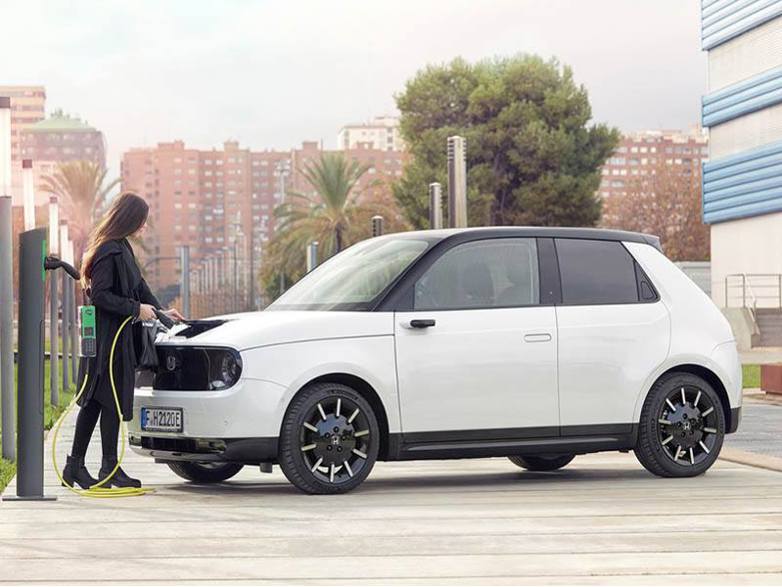
Honda e Hatchback
Next up is the all-new Honda e. This retro-styled city car not only looks futuristic but is packed with the latest in technology inside, with a wall of screens and wing mirrors replaced with screens on some models.
On a standard UK energy tariff, the Honda e costs just £4.90 to charge, but with costs as low as £3.09 on an Economy 7 tariff, it makes sense to charge this small and charismatic city car overnight. The Honda e delivers a claimed 136-mile range from its 35.5kWh battery, making the cost per mile just 2.3p
There are two models to choose from with the Advance e model bringing a slightly more powerful motor (152hp) for extra acceleration when you need it.
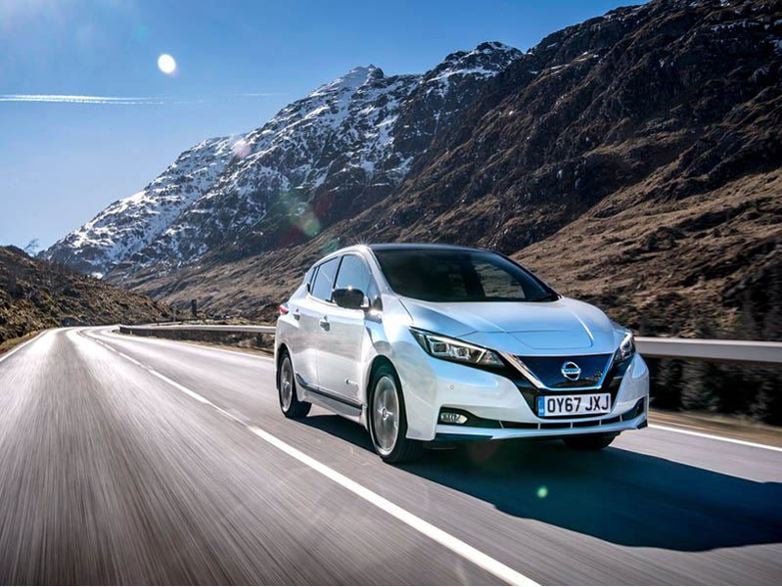
Nissan LEAF
Few electric cars can beat the Nissan Leaf when it comes to popularity. This stylish supermini has been a firm favourite with EV adopters since its launch in 2010, and the latest generation model builds on its success with an extended mileage range and revised style.
On a standard UK energy tariff, the Nissan Leaf costs £5.52 to charge, dropping to £3.48 on an Economy 7 tariff. For this, its 40kWh battery delivers an impressively claimed range of 168 miles, making the cost per mile just 2p.
Thanks to up regenerative braking, the new Nissan Leaf helps to keep costs low, adding charge back into the batteries when you lift off the accelerator. This means most drivers need not use the brake pedal as often as merely easing off the throttle causes the car to slow down relatively quickly.
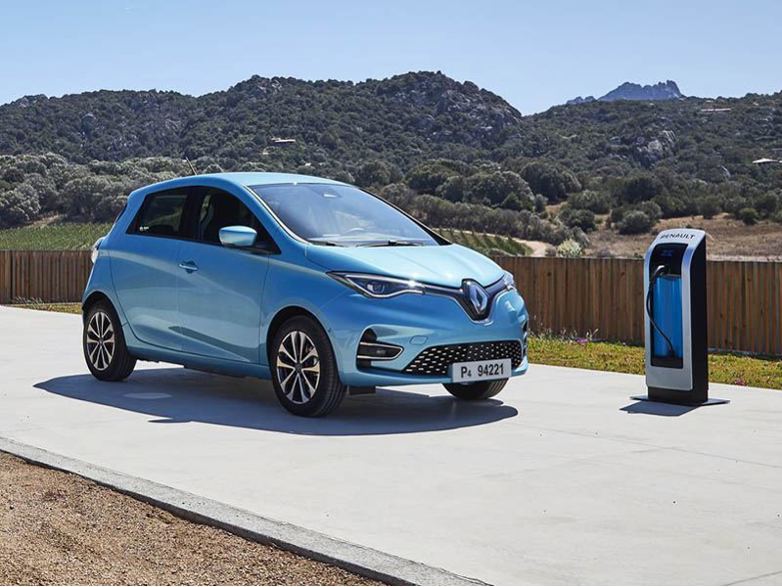
Renault Zoe
If the Nissan Leaf doesn’t catch your eye, check out its French rival – the Renault Zoe. Recently refreshed, this classy supermini boasts improved efficiency and range, as well as a more powerful motor for when you need that extra boost of power.
On a standard UK energy tariff, the Renault Zoe costs £5.66 to charge, dropping to £3.57 on an Economy 7 tariff. Its 41.0kWh battery delivers a claimed range of 186 miles making it ideal for those who need to travel further, putting the cost per mile at an impressive 1.9p
It also pretty impressive when it comes to specification, with touchscreen sat-nav, climate control, air-conditioning and parking sensors, available on selected models.
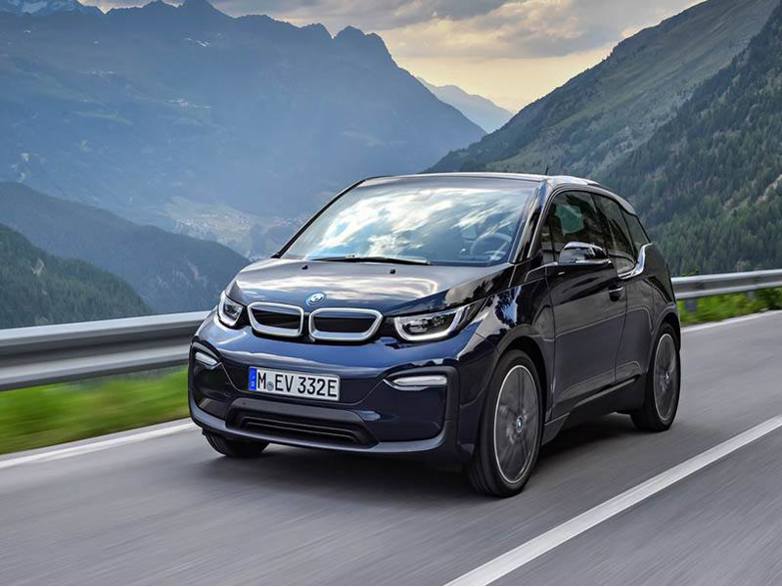
BMW i3
Finally, no list would be complete without the BMW i3. Making electric cars sexy and desirable, the i3 not only looks great, but it delivers everything you need, combining power with economy.
On a standard UK energy tariff, the BMW i3 costs £5.82 to charge, but just £3.67 on an Economy 7 tariff. Its 42.2kWh battery delivers a claimed range of 193 miles, putting the cost per mile at just 1.9p
As expected from a BMW, the i3 also packs a punch when required with the 0-62mph dash taking just 7.3 seconds and a top speed limited to 93mph. Add in rear-hinged back doors and a carbon-fibre structure, the i3 is impressively light, improving acceleration and helping it to travel further per charge. What’s not to like?
Thinking of leasing an electric car? Check out our full range of electric vehicles or visit our electric guides for more information.
Guide Information
Originally published: 8th December 2020
Last updated: 8th December 2020
